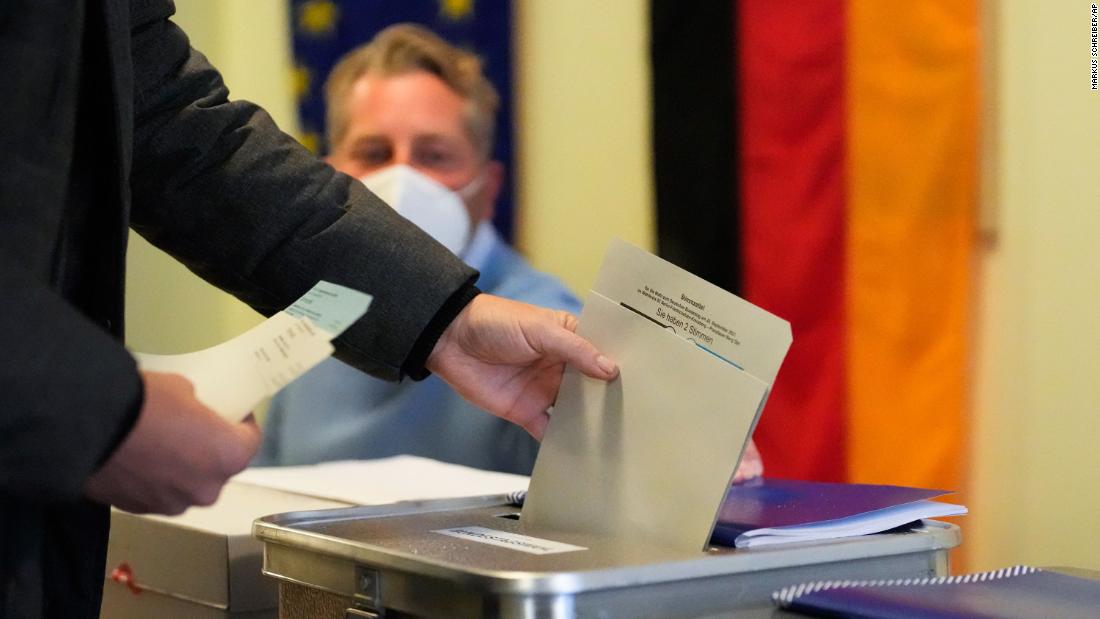The narrowness of the margins means the German elections are at this point too close to call and predicting the next government — and chancellor — is impossible. A large number of postal ballots also remain to be counted.
Whichever party comes out in front, lengthy coalition negotiations are expected before a government can be formed.
But for the SPD, coming out neck-and-neck with the CDU counts as a significant gain. The left-leaning party took 20.5% of the vote in the country’s last general election, in 2017.
“The voters have decided that the Social Democratic party has gained, and this is a great success,” said SPD leader Olaf Scholz in remarks at his party’s headquarters.
Scholz said the voters wanted him to be next chancellor. “Many citizens have put their crosses next to the SPD because they want there to be a change in government and also because they want the next chancellor of this country to be called Olaf Scholz.”
“Pragmatism, optimism, unity that is what we will show because that is what counts, and I am sure the citizens will also be happy post election about their decision,” he added.
Loud applause and cheering from jubilant party supporters interrupted Scholz as he spoke.
“Now we will await the final result, but then we will get to work. Thank you!” Scholz said.
Robin Fugmann, 20, an ardent Scholz supporter, told CNN he was delighted by the results so far.
“It is really an amazing result, people believe in Olaf Scholz, people believe that Armin Laschet really cannot lead this country,” he said. “So we really have the mandate to lead a new government — I hope we will do so. And first of all we are going to celebrate because this is a really amazing result.”
By contrast, the mood at CDU headquarters was downcast as the initial exit polls emerged, suggesting the CDU could be looking at the worst result in its history.
The party “cannot be content with this result,” CDU leader Armin Laschet told supporters, while noting that the result remained unclear.
“We can foresee that there could be a government with three parties,” he said, as he said the party would “do everything to try to build a coalition.”
Laschet added that the CDU had “got a mandate against a leftist government.”
The party had campaigned on a message of stability for the country after Merkel, seen as a steady pair of hands over the past nearly 16 years, steps down.
“This is a result with bitter losses — there’s no way to sugarcoat it,” said CDU secretary-general Paul Zemiak. “This result really hurts.”
But, Zemiak added, the results are not yet final. “The evening is long and we will see what the next few hours will bring,” he said.
The crowd at the Green party headquarters in Berlin cheered as the first exit polls were being read out.
Greens’ leader Annalena Baerbock thanked the party’s supporters, saying: “We have led a campaign as we have never before experienced in this country — around the clock, until last night, the last second.”
The outgoing government remains in office as acting government until it is replaced by a new government. Chancellor Angela Merkel, 67, will then stand down and the new chancellor will take the reins.
CNN’s Frederik Pleitgen, Salma Abdelaziz, Nadine Schmidt and Stephanie Halasz reported from Berlin and Laura Smith-Spark wrote from London. CNN’s Inke Kappeler contributed to this report.




More News
Opinion | Activism Thrives on Campus. What Happens After Graduation?
Biden Asks What Trump Would Have Done if Capitol Rioters Were Black
Alito Refuses Calls for Recusal Over Display of Provocative Flags